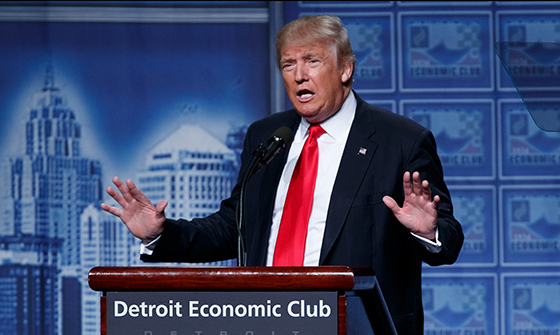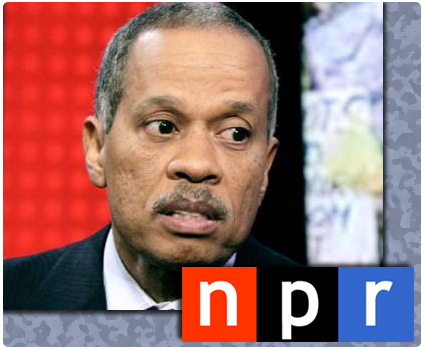It really is a simple choice.

Donald Trump delivers an economic policy speech to the Detroit Economic Club, Monday, Aug. 8, 2016, in Detroit. (AP Photo/Evan Vucci)
Listen To You Tell Me Texas Friday 8/12/16
Download
Donald Trump laid out his economic agenda this week in a speech to the Detroit Economic Club. His plan calls generally to sharply reduce taxes.
The most dramatic plank in Trump’s plan concerns corporate tax rates. They would be slashed. American corporations currently pay taxes on net income at the rate of 35 percent. Under Trump’s plan, that rate would drop to 15 percent.
Those on the right – including even his critics on the right – have generally praised Trump’s plan. Predictably, those on the left, including Hillary Clinton, have had nothing kind to say about it. Said Mrs. Clinton:
Here’s what we all know, because we heard it again: His tax plans will give super big tax breaks to large corporations and the really wealthy, just like him and the guys who wrote the speech, right?”
And thus we have a very clear contrast between what the Left believes and what conservatives believe. It boils down to a single question: who can better deploy the fruits of American enterprise – the federal government or those who actually produce the fruit?
Mrs. Clinton’s position plays to economic ignorance and stereotypes. Her rhetoric conjures images of heartless Gordon Gekkos sitting in plush offices in tall office towers hoarding great piles of cash created through the ruthless exploitation of workers and consumers.
At no time does Mrs. Clinton ever float the idea that profits are the result of having succeeded in a highly competitive marketplace.
So what do successful corporations and wealthy individuals do with the money they keep after having paid taxes on their earnings?
One thing they do not do is pile up cash. A big pile of cash is worthless. In the current zero-interest rate environment, it effectively loses value via inflation every month. On the balance sheet of a publicly traded company, it attracts the negative attention of shareholders who quite reasonably expect that the cash either be put to work doing something productive or distributed to shareholders in the form of a dividend.
Rich people and successful corporations put money to work. Wealthy people invest. They buy houses and cars and airplanes that thousands of people get paid to build and maintain. Companies create new products and build new facilities that result in the hiring of workers.
Every dollar taken away from companies and successful individuals in the form of taxes incrementally reduces such investment. When money is confiscated through taxation, instead of being deployed into the free market economy to create jobs and increase opportunities for workers and entrepreneurs, it is swallowed into the giant, inefficient, bloated and pustulated federal bureaucracy, where great gobs of it get wasted (see “American Recovery & Reinvestment Act of 2009,” a.k.a. the “Stimulus”).
Trump’s plan will ultimately increase federal revenues as a result of increased economic activity and increased earnings for individuals and companies.
Hillary’s plan to raise taxes will have just the opposite effect.
The choice – little understood as it is by far too many – really is that simple.








You are correct Paul Gleiser “It really is a simple choice” if you are voting and or supporting a man who has bamboozled the American people in believing he cares about them, is a self-serving narcissist, racist who has an obsession with bragging about how rich he is, building walls, banning Muslims, deporting Mexicans, opposes free trade, starting a global war, trash talking his opponents, and the media. I question Donald Trump’s ability to keep America safe.
More importantly I believe that former Speaker of the House and Texas native Sam Rayburn was correct when he said the following “Any jackass can kick down a barn but it takes a good carpenter to build one.” Donald Trump is no carpenter when it comes to America.
Mark Olinger, your sick.
To Mr. Mark Olinger, you sound like one of the “jackasses” that want kick America back into the 18th century. And I guess you like the idea of “illegal” persons coming into America from who knows where and with whatever intentions. Maybe to blow you up somewhere. Or shoot you. And I barely have a “pot” to do you know what in, but I admire someone who has been able to make a lot of money. And he has built a bunch of buildings that I would not call barns.
As to why Hillary Clinton was NOT indicted after FBI Director Jim Comey made his remarks before Congress concerning his findings of her total disregard for the safeguarding of U.S. national security, specifically top secret classified communications, is still a mystery to millions of law abiding American citizens. On that issue alone, she–Hillary Clinton–is utterly UNFIT to hold the office of President, ever.
As far making the right choice for President on qualifications and preparedness for office to return AMERICA to prosperity, Mr. Gleiser, you are absolutely correct. If Hillary where to be elected, her liberal progressive statist policies would be a disaster, a “wrecking ball,” continuing the destructive economic path which President Obama has pushed our country down, over the last 7 going on 8 years.
Donald Trump, yes! I stand with him, as he has the credentials to truly, Make America Great Again!
Everyone has an opinion and it seems that the person leaving a comment before me has an especially bad one. Mr. Trump has put thousands upon thousands of people to work. Sure he has made a lot of money but he has done so by making wise choices, unlike some people. He has made and yes, he has lost a lot of money in his lifetime. Any successful person has at some point in their lives. According to the woman running for president, Mr. Trump isn’t qualified to be President. I beg to differ because he has way MORE qualifications than the present one who occupies the oval office. OR someone who was stupid enough to use a private server to conduct business or to ALLOW our people to die in Bengazi from the lack of her sending aid that was begged for! This is the person who says Trump is not qualified??? It was under the clinton presidency that a mass exodus of businesses left the country because of her husbands high corporate taxes! It was her who wanted this obamacare mess, only in HER name back when her husband was president! How quickly people forget! Well, you should remember these things come time to vote and vote for the one who can HELP this country, not bring it the rest of the way down as obama has started…a vote for hillary will only finish what obama started! Mr. Trump will bring this country back up and bring greatness back into our vocabulary! You will NOT see Mr. Trump apologising for America!
AND SPEAKING OF TAXES, what’s Trump hiding by not releasing his?
Mitt Romney manned-up when it was his turn.
And Romney, among other Republicans, reckons “there’s a bombshell” there.
And speaking of taxes, what was Hillary hiding when 96% of her “charitable” contributions went to her own foundation? hmmmmmmm. Trump already released a financial statement long ago, and IF you know anything about finances, you would know there is more information there than any tax return. On top of that, he is under audit, and I never made nearly the money Trump does, but if I was under audit, I wouldn’t release anything either. BTW….When did it become necessary to see someone’s tax return to determine their qualifications for candidacy or any job for that matter? Do any of you spread your tax return around? I don’t care how much money he makes, gives away, or has. He’s been audited many times and hasn’t had to pay penalties and interest, so obviously he uses the tax code to minimize what the government steals as much as he can, and for that I don’t blame him one bit. If he can make money for our country like he’s made money for himself, his businesses and his employees, I’m for it.
Recently Hillary Clinton said, and this is a word-for-word quote, “The rich need to pay their fair share of taxes so we can grow this economy.” What she is saying is that if we will just give the government more of our tax dollars through even higher taxes, the government will grow the economy and create jobs as it spends that money. That’s the tired old socialist notion. Better to go with Trump. Government grows nothing, even as it makes crooks like Bill and Hillary rich. Free enterprise and low tax rates, that has and always will grow an economy.
Paul, I am glad that your post exposed the ideological depravity of Hillary-the-Great and her bottomless ignorance of the free market and her total loyalty to the “fool’s errand” to follow Marxism and all of its evil consequences. The contrast of Her Majesty against the flawed but loyal American in the name of Mr. Trump has exposed the fools in our midst that can’t resist supporting another fool (Hillary) of an even greater menace to our future as a civil society.
Plainly speaking, anyone that can’t see the destructive nature of 8 years of Obama and furthermore, wants to accelerate the dismantling of the American culture by Hillary to the point of no return has given me a new appreciation of the definition of the FOOL. I would rather the fool speak and enlighten us than to follow the advice of Abraham Lincoln or Mark Twain (author unsure) who said: “Better to remain silent and be thought a fool than to speak and to remove all doubt.” I just hope there are enough educated Americans that care about this country’s future to be alarmed at the mainstream acceptance of the FOOLS in our midst in order to try to defeat them at all costs.
Mrs. Clinton’s stupid but frequent talking point that the wealthy will get a huge tax break just exemplifies the utter ignorance or lack of integrity of the Democrat candidates and constituents. Let’s see how this can be explained in real simple terms…..if there is a tax reduction in any form, the ones who pay the most taxes will realize the most tax savings. Let’s try another simple explanation…..those who pay very little or in the case of about 50% of our fellow citizens who pay NO taxes, there will be less tax savings. I know this is a difficult concept to grasp, but let’s give it a shot, and stop all the class warfare. As Paul points out, these tax savings in the hands of the taxpayers will stimulate the economy through more consumption of goods and services. This same revenue in the hands of government will generate nothing, except more power for the Democrats through votes from their gullible dependents or their well-connected cronies and political supporters. Sadly, I think that the quote from former speaker Sam Rayburn was even more correct than was intended; it certainly does take a jackass or a donkey, which is the Democrat mascot, to kick down a barn or “one nation under God”.
http://www.eclectablog.com/2016/08/the-biggest-story-of-the-year-is-how-republicans-starved-the-economy.html
http://www.usatoday.com/story/money/columnist/abrams/2016/09/07/abrams-donald-trump-no-help-small-businesses/89956196/